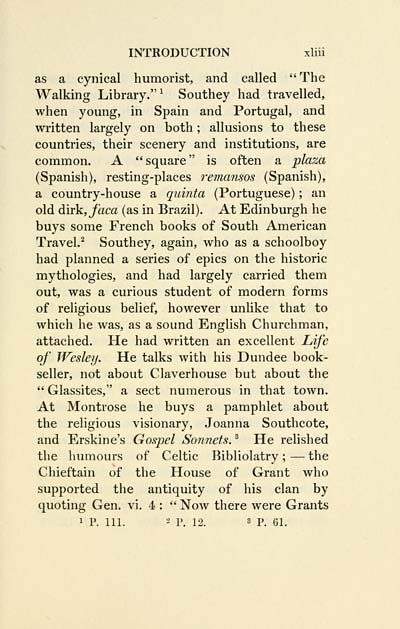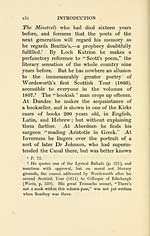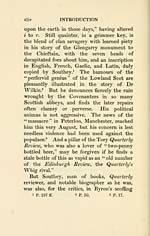Download files
Complete book:
Individual page:
Thumbnail gallery: Grid view | List view

INTRODUCTION xliii
as a cynical humorist, and called "The
Walking Library."^ Southey had travelled,
when young, in Spain and Portugal, and
written largely on both ; allusions to these
countries, their scenery and institutions, are
common. A "square" is often a plaza
(Spanish), resting-places remansos (Spanish),
a country-house a quinta (Portuguese) ; an
old dirk, yam (as in Brazil). At Edinburgh he
buys some French books of South American
Travel.^ Southey, again, who as a schoolboy
had planned a series of epics on the historic
mythologies, and had largely carried them
out, was a curious student of modern forms
of religious belief, however unlike that to
which he was, as a sound English Churchman,
attached. He had written an excellent Life
of Wesley. He talks with his Dundee book-
seller, not about Claverhouse but about the
" Glassites," a sect numerous in that town.
At Montrose he buys a pamphlet about
the religious visionary, Joanna Southcote,
and Erskine's Gospel Sonnets. ^ He relished
the humours of Celtic Bibliolatry ; — the
Chieftain of the House of Grant who
supported the antiquity of his clan by
quoting Gen. vi. 4 : " Now there were Grants
1 P. 111. 2 P. 12. 3 p. 61.
as a cynical humorist, and called "The
Walking Library."^ Southey had travelled,
when young, in Spain and Portugal, and
written largely on both ; allusions to these
countries, their scenery and institutions, are
common. A "square" is often a plaza
(Spanish), resting-places remansos (Spanish),
a country-house a quinta (Portuguese) ; an
old dirk, yam (as in Brazil). At Edinburgh he
buys some French books of South American
Travel.^ Southey, again, who as a schoolboy
had planned a series of epics on the historic
mythologies, and had largely carried them
out, was a curious student of modern forms
of religious belief, however unlike that to
which he was, as a sound English Churchman,
attached. He had written an excellent Life
of Wesley. He talks with his Dundee book-
seller, not about Claverhouse but about the
" Glassites," a sect numerous in that town.
At Montrose he buys a pamphlet about
the religious visionary, Joanna Southcote,
and Erskine's Gospel Sonnets. ^ He relished
the humours of Celtic Bibliolatry ; — the
Chieftain of the House of Grant who
supported the antiquity of his clan by
quoting Gen. vi. 4 : " Now there were Grants
1 P. 111. 2 P. 12. 3 p. 61.
Set display mode to: Large image | Transcription
Images and transcriptions on this page, including medium image downloads, may be used under the Creative Commons Attribution 4.0 International Licence unless otherwise stated. ![]()
| Early Gaelic Book Collections > Ossian Collection > Journal of a tour in Scotland in > (49) |
|---|
| Permanent URL | https://digital.nls.uk/79894490 |
|---|
| Description | Selected books from the Ossian Collection of 327 volumes, originally assembled by J. Norman Methven of Perth. Different editions and translations of James MacPherson's epic poem 'Ossian', some with a map of the 'Kingdom of Connor'. Also secondary material relating to Ossianic poetry and the Ossian controversy. |
|---|
| Description | Selected items from five 'Special and Named Printed Collections'. Includes books in Gaelic and other Celtic languages, works about the Gaels, their languages, literature, culture and history. |
|---|

